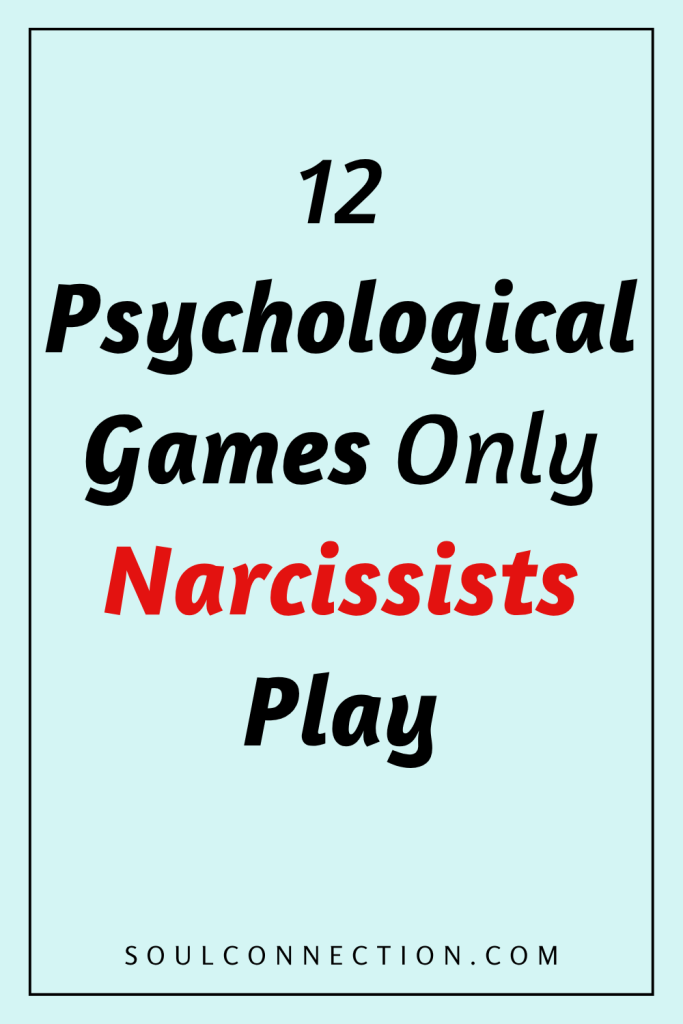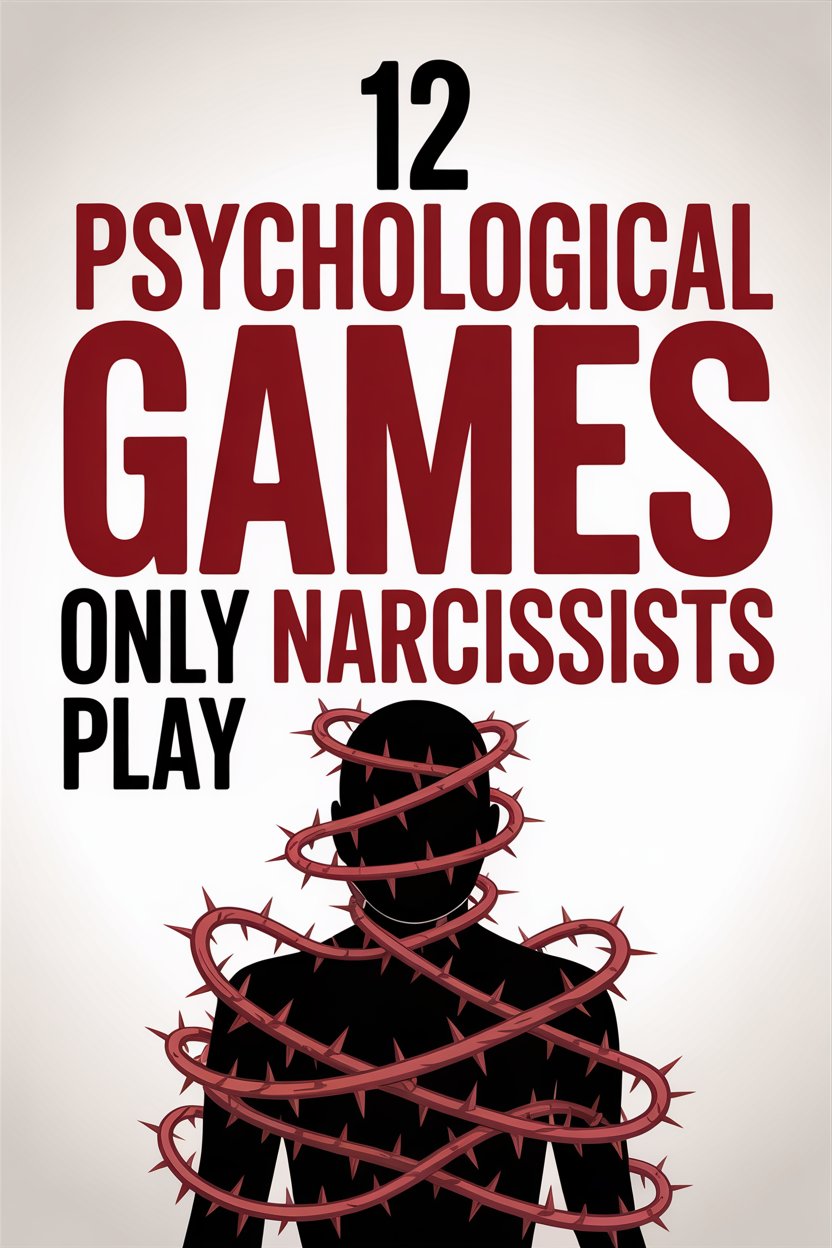Narcissists: those charming, magnetic, endlessly complicated people who turn relationships into an emotional rollercoaster none of us queued up for.
If you’ve ever found yourself stuck in a conversation that somehow circles back to their favorite topic (themselves), you know the type.
Recognizing the games they play isn’t just about protecting your sanity—it’s about reclaiming your peace and maybe, finally, finishing a sentence.
Ready for a field guide to the narcissist’s greatest hits? Here’s how their favorite psychological games unfold, and what you can do to stop playing along.
1. Gaslighting Is Their Olympic Sport
Narcissists don’t just twist facts—they wring them out like a wet dishcloth and leave you wondering if you’re losing your mind. Gaslighting involves denying things they’ve said or done, making you question your own reality.
“I never said that.” “You’re too sensitive.” “That never happened.” Suddenly, you’re doubting your own memory and apologizing for things you were dead right about.
Pro tip: Keep a mental or literal notebook. It’s harder for them to rewrite history when you have receipts.
2. Love Bombing to Hook You In
The beginning’s all fireworks and compliments. “You’re the most amazing person I’ve ever met!” “No one else understands me like you do.” It’s so intense, it can feel like a Disney montage.
But this isn’t lasting devotion—it’s a bait-and-switch. Once you’re hooked, the compliments fizzle and the games heat up.
When it feels too good to be true, pump the brakes. Genuine love grows, it doesn’t explode out of nowhere and then vanish.
3. Playing the Victim Card
A narcissist can turn a spilled coffee into a three-act tragedy starring them as the innocent sufferer. Everything bad “happens” to them, and somehow it’s always your fault.
Cue the sighs, the dramatic texts, and stories about how everyone is out to get them.
Don’t take the bait. Healthy relationships share responsibility for problems.
If you’re always cast as the villain, something’s off.
4. Triangulation for Maximum Chaos
Why argue one-on-one when you can drag others in? Triangulation is classic narcissist mischief: pitting people against each other, relaying half-truths, and stirring up jealousy.
“Well, Sarah agrees with me.” “You should’ve heard what Jamie said about you.”
Keep your conversations direct. If someone tries to drag a third party into your issues, step back. There’s usually more manipulation than information in the mix.
5. The Silent Treatment, a Classic Power Move
Narcissists love to vanish into thin air just when you’re desperate for answers. You’ll get ghosted, ignored, or met with icy stares. Unlike a peaceful timeout, this is about control and punishment.
Don’t grovel or chase. If someone needs space, fine.
But if they use silence to control you, respect yourself enough to stop waiting by the phone.
6. Moving the Goalposts
Ever feel like their expectations are always changing? You reach the bar they set, only for it to be raised. “That’s good, but I need more.”
Nothing’s ever enough, because if you actually succeeded, they’d lose their leverage.
Set clear, reasonable limits for yourself. Pleasing someone who thrives on disappointment is a losing battle.
7. Backhanded Compliments and Subtle Put-Downs
Compliments that leave you feeling a bit…crummy? “You look great for your age.” “I wish I didn’t care about looks as much as you do.”
These “compliments” are aimed at undermining your confidence, while allowing the narcissist to maintain plausible deniability.
Call it out—lightly, if needed. “That’s an interesting compliment. Are you trying to say I’m ancient?”
Sometimes, shining a spotlight on the oddness is enough to make them back off.
8. Blame-Shifting Is Their Superpower
When something goes wrong, guess whose fault it never is? Anything from burnt toast to the collapse of empires will land squarely at your feet. Narcissists are allergic to accountability.
Refuse to own mistakes that aren’t yours. Calmly assert, “I don’t agree that was my fault,” and move on. No one needs to be the universal scapegoat.
9. Future Faking to Keep You Hooked
Promises flow like cheap wine: moving in together, grand vacations, a dreamy future. Every time things get rocky, a new promise rolls out.
The catch? Those plans never seem to materialize.
Watch for patterns rather than words. If those castles in the sky never get built, believe the evidence. You’re worth someone who follows through.
10. The Martyr Routine
Narcissists love to play the tireless giver. “I do everything for you, and you appreciate nothing.” You might start feeling guilty for even small requests, since they’re apparently sacrificing so much.
Notice if you’re being manipulated into silence or servitude. Relationships are partnerships, not endless tests of gratitude.
11. Rewriting History
Somehow, the past always bends in their favor. They remember arguments you lost, jokes they made, and mistakes you never actually made.
It’s like living with a revisionist historian—except you don’t get to check the sources.
If you catch this game in action, trust your own memory. There’s no need to win debates over events you lived through.
12. Disappearing Empathy
In the rare moments when you need support, don’t be surprised if your narcissist partner is suddenly busy, distracted, or rolling their eyes.
When their problems are front and center, they want attention. Yours? Not so much.
Seek support from people who show up. You deserve care and empathy, not a one-way street.
Breaking the Cycle and Getting Back to Yourself
Narcissists can turn everyday life into an exhausting chess match. Their games aren’t about love; they’re about keeping the spotlight fixed firmly on themselves.
Recognizing these patterns is the first step toward regaining control and peace of mind.
Give yourself permission to set boundaries, validate your own experience, and seek support from people who can listen without turning it into a one-person show.
Whether you stay, go, or build a fortress of emotional distance, know that none of this is your fault—and regaining your sense of self is the real win.


